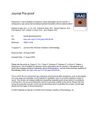 22 citations,
September 2015 in “Clinical lymphoma myeloma & leukemia/Clinical lymphoma, myeloma and leukemia”
22 citations,
September 2015 in “Clinical lymphoma myeloma & leukemia/Clinical lymphoma, myeloma and leukemia” Recognizing and treating skin symptoms in essential thrombocythemia is crucial for patient quality of life.
 21 citations,
April 2019 in “Endocrinology and Metabolism Clinics of North America”
21 citations,
April 2019 in “Endocrinology and Metabolism Clinics of North America” Transgender patients need proper skin care, especially when undergoing hormone treatments, to manage issues like acne and hair loss.
 19 citations,
November 2011
19 citations,
November 2011 Using systemic drugs as creams for skin conditions shows promise, but more research is needed to confirm their effectiveness and safety.
 18 citations,
October 2018 in “Journal of The American Academy of Dermatology”
18 citations,
October 2018 in “Journal of The American Academy of Dermatology” Some skin medications can harm male fertility, but they don't seem to cause birth defects from father's exposure.
 14 citations,
September 2017 in “Clinics in Dermatology”
14 citations,
September 2017 in “Clinics in Dermatology” Skin diseases linked to insulin resistance should be managed to prevent diabetes and reduce heart disease risk.
 13 citations,
August 2005 in “Dermatologic Clinics”
13 citations,
August 2005 in “Dermatologic Clinics” Doctors should consider psychological factors when treating skin conditions and work with mental health experts.
 12 citations,
October 2018 in “International Journal of Women's Dermatology”
12 citations,
October 2018 in “International Journal of Women's Dermatology” Hormone therapy in transgender women can affect hair growth and acne, and there are specific skin issues related to gender-affirming surgery, but more research is needed on their dermatological health.
 11 citations,
March 2019 in “Journal of The American Academy of Dermatology”
11 citations,
March 2019 in “Journal of The American Academy of Dermatology” Some men taking finasteride for hair loss may experience sexual problems like erectile dysfunction and decreased sex drive, which can persist even after stopping the medication.
 9 citations,
September 2015 in “Medical Clinics of North America”
9 citations,
September 2015 in “Medical Clinics of North America” The document explains how to do skin procedures, care after surgery, and when to use certain treatments.
 5 citations,
January 2017 in “Clinics in Dermatology”
5 citations,
January 2017 in “Clinics in Dermatology” Skin symptoms without a medical cause often reflect psychological stress and are influenced by culture, requiring a team approach for treatment.
 4 citations,
March 2009 in “British Journal of Dermatology”
4 citations,
March 2009 in “British Journal of Dermatology” The conference highlighted new dermatological treatments and emphasized early intervention and addressing conditions lacking evidence-based treatments.
 3 citations,
May 2021 in “Dermatologic Clinics”
3 citations,
May 2021 in “Dermatologic Clinics” COVID-19 changed dermatology by increasing telemedicine and highlighting healthcare disparities.
 2 citations,
May 2020 in “Anais brasileiros de dermatologia/Anais Brasileiros de Dermatologia”
2 citations,
May 2020 in “Anais brasileiros de dermatologia/Anais Brasileiros de Dermatologia” Primary health care in Florianópolis mostly treated simple skin conditions, while secondary care handled more complex skin diseases.
 2 citations,
March 2014 in “Dermatologic Clinics”
2 citations,
March 2014 in “Dermatologic Clinics” The editor suggests removing "race" and "ethnicity" from dermatology and creating tools to objectively assess skin color and hair texture.
 1 citations,
July 2012 in “British Journal of Dermatology”
1 citations,
July 2012 in “British Journal of Dermatology” New treatments and management strategies for skin conditions like melanoma and Spitz naevi were discussed at the dermatologists' meeting.
 January 2021 in “Journal of The American Academy of Dermatology”
January 2021 in “Journal of The American Academy of Dermatology” The authors concluded that PRP injections were not significantly effective for treating lichen planopilaris and its variants and should not be used as the only treatment.
 June 2018 in “Disease-a-Month”
June 2018 in “Disease-a-Month” Remove inflamed cysts surgically, avoid topical antibiotics on wounds, treat skin and mouth conditions with specific medications, and address underlying causes of hair loss.
 July 2014 in “Disease-a-Month”
July 2014 in “Disease-a-Month” The document gives treatment advice for various skin conditions, like using metronidazole for perioral dermatitis and minoxidil for hair loss.
 May 2002 in “British Journal of Dermatology”
May 2002 in “British Journal of Dermatology” A pregnant woman's skin condition improved after giving birth, possibly due to high estrogen levels during pregnancy.
 159 citations,
March 2014 in “Journal of The American Academy of Dermatology”
159 citations,
March 2014 in “Journal of The American Academy of Dermatology” Some skin medications are safe during pregnancy and breastfeeding, but others can harm the baby and should be avoided.
 73 citations,
March 2014 in “Journal of The American Academy of Dermatology”
73 citations,
March 2014 in “Journal of The American Academy of Dermatology” Most dermatologic medications are safe during pregnancy and breastfeeding, but some should be avoided due to potential risks.
 34 citations,
August 2005 in “Dermatologic Clinics”
34 citations,
August 2005 in “Dermatologic Clinics” Stress and emotional factors can worsen skin conditions by affecting the immune system.
 22 citations,
November 2014 in “Psychiatric Clinics of North America”
22 citations,
November 2014 in “Psychiatric Clinics of North America” Stress can worsen skin conditions and affect mental health, so doctors should include stress management in skin treatment.
 17 citations,
April 2006 in “Dermatologic Clinics”
17 citations,
April 2006 in “Dermatologic Clinics” Older women face various skin issues like dryness and thinning, and treatments are available but can have side effects; proper skin care and legal health decisions are important.
 15 citations,
February 2017 in “Nursing Clinics of North America”
15 citations,
February 2017 in “Nursing Clinics of North America” Targeted cancer therapies can cause skin side effects, which should be treated early to help patients' quality of life and treatment adherence.
 14 citations,
April 2014 in “Medical Clinics of North America”
14 citations,
April 2014 in “Medical Clinics of North America” The document concludes that quick referral and appropriate treatments are crucial for managing common skin conditions and preventing permanent damage.
 8 citations,
May 2010 in “Dermatologic clinics”
8 citations,
May 2010 in “Dermatologic clinics” New treatments for skin conditions in children include a preferred drug for birthmark reduction, proactive creams for eczema and vitiligo, a safe psoriasis medication, and special tissues and socks for eczema and fungal infections.
 3 citations,
March 2008 in “Medical laser application”
3 citations,
March 2008 in “Medical laser application” Lasers have become safer and more effective for treating skin problems and hair removal.
 2 citations,
February 2009 in “Journal of the American Academy of Dermatology”
2 citations,
February 2009 in “Journal of the American Academy of Dermatology” Many research paper titles in dermatology journals lack scientific precision.
 63 citations,
April 2018 in “Journal of the American Academy of Dermatology”
63 citations,
April 2018 in “Journal of the American Academy of Dermatology” Topical JAK inhibitors may help treat some skin conditions but need more research.






























